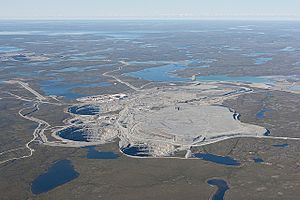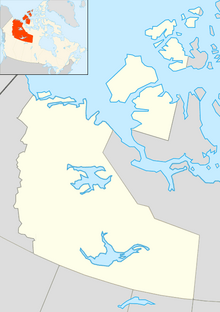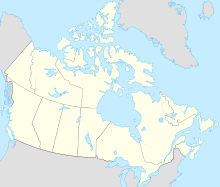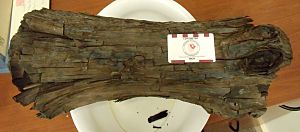Ekati Diamond Mine facts for kids

Ekati mine aerial view, August 2010. Four open pits on four kimberlite pipes may be seen, along with the Ekati airport.
|
|
| Location | |
|---|---|
| Location | Lac de Gras |
| Territory | Northwest Territories |
| Country | Canada |
| Coordinates | 64°42′49″N 110°37′10″W / 64.71361°N 110.61944°W |
| Production | |
| Products | Diamonds |
| History | |
| Opened | 1998 |
| Owner | |
| Company | Dominion Diamond Mines (90%), Stewart Blusson (10%) |
| Website | www.ddcorp.ca |
The Ekati Diamond Mine is Canada's first mine to dig for diamonds both from the surface and underground. It's located far north in the Northwest Territories, about 310 kilometers (193 miles) northeast of Yellowknife. This mine is also about 200 kilometers (124 miles) south of the Arctic Circle, near a lake called Lac de Gras.
Until 2014, Ekati was a joint project. Dominion Diamond Mines owned 80% of it. The other 20% was owned by two geologists, Chuck Fipke and Stewart Blusson. These two scientists discovered the special rock formations, called kimberlite pipes, that hold diamonds. Later, Chuck Fipke sold his share to Dominion Diamond Mines.
Contents
Discovering Diamonds: The Ekati Story
How Ekati Diamond Mine Started
The first volcanic pipe found in the Lac de Gras area was the Point Lake kimberlite. It was discovered by Chuck Fipke and Stewart Blusson. They had been exploring the region for almost ten years. They first found signs of kimberlite rock as early as 1985.
The Point Lake kimberlite itself didn't have enough diamonds to be worth mining. However, its discovery led to one of the biggest "staking rushes" in mining history. A staking rush is when many people quickly claim land in hopes of finding valuable minerals. This rush covered most of the area between Yellowknife and the Arctic coast.
Ekati's Operations and Future
There are 156 known kimberlite pipes within the Ekati mining area. This includes the Point Lake pipe. The Ekati Diamond Mine officially started working on October 14, 1998. It was first run by BHP Billiton Canada Inc., a very large mining company.
The next diamond-rich kimberlites to be mined at Ekati are called Jay and Sable. These were found in 1993 and 1995. They will be mined using open pit methods, which means digging from the surface. Underground mining of the Misery kimberlite will start in 2020. This will happen after the open pit operations there are finished. The Ekati Diamond Mine is expected to keep running until 2033.
In 2012, the Harry Winston Diamond Corporation bought Ekati for US$500 million. This company is now known as Dominion Diamond Mines.
Diamond Geology: How Diamonds Form
Where Ekati's Diamonds Are Found
The diamonds at the Ekati mine are found in kimberlite pipes. These pipes are between 45 and 62 million years old. They are part of the Lac de Gras kimberlite field. Most of these pipes are located under shallow lakes. Kimberlite pipes are like ancient volcanoes that brought diamonds closer to the Earth's surface.
Mining and Selling Diamonds
How Diamonds Are Mined at Ekati
Between 1998 and 2009, the Ekati mine produced 40 million carats of diamonds. That's about 8,000 kilograms (17,637 pounds) of diamonds! These came from six open pits. A carat is a unit of weight used for gemstones.
As the easily accessible diamonds near the surface ran out, miners started using underground methods. Currently, there is one underground operation called Koala. Open-pit mining is still happening in Fox Pit. The mine now produces about 7.5 million carats (1,500 kilograms or 3,307 pounds) of diamonds each year.
Selling Ekati's Diamonds
Ekati sells its rough diamonds to the global market. They have sorting and selling operations in Canada, Belgium, and India. This means the diamonds are cleaned, sorted by quality, and then sold to buyers around the world.
Getting to the Mine
Transportation for Workers
Mine workers travel to and from the Ekati mine by plane. They use the Ekati Airport for their fly-in fly-out shifts.
 | Precious Adams |
 | Lauren Anderson |
 | Janet Collins |




